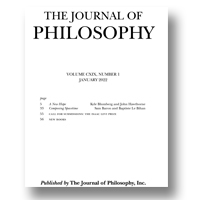|
1.
|
The Journal of Philosophy:
Volume >
118 >
Issue: 11
Benjamin Lennertz
Quantificational Attitudes
abstract |
view |
rights & permissions
| cited by
The literature contains a popular argument in favor of the position that conditional attitudes (especially intentions and desires) are not simple attitudes with conditional contents but, rather, have a more complex structure. In this paper I show that an analogous argument applies to what we might call quantificational attitudes—like an intention to follow every bit of good advice I receive or a desire to get rabies shots for each bite I incur from an infected bat. The conditions under which these attitudes are satisfied and thwarted are not captured by claiming that they are simple attitudes with quantificational contents. So, the argument supports a novel position—that quantificational attitudes have a more complex structure. After sketching the form of this extra structure, I show how similar considerations count in favor of the existence of genuinely quantificational speech acts.
|
|
|
2.
|
The Journal of Philosophy:
Volume >
118 >
Issue: 11
Zachary C. Irving
Drifting and Directed Minds: The Significance of Mind-Wandering for Mental Agency
abstract |
view |
rights & permissions
| cited by
Perhaps the central question in action theory is this: what ingredient of bodily action is missing in mere behavior? But what is an analogous question for mental action? I ask this: what ingredient of active, goal-directed thought is missing in mind-wandering? My answer: attentional guidance. Attention is guided when you would feel pulled back from distractions. In contrast, mind-wandering drifts between topics unchecked. My unique starting point motivates new accounts of four central topics about mental action. First, its causal basis. Mind-wandering is a case study that allows us to tease apart two causes of mental action––guidance and motivation. Second, its experiential character. Goals are rarely the objects of awareness; rather, goals are “phenomenological frames” that carve experience into felt distractions and relevant information. Third, its scope. Intentional mind-wandering is a limit case of action where one actively cultivates passivity. Fourth, my theory offers a novel response to mental action skeptics like Strawson.
|
|





